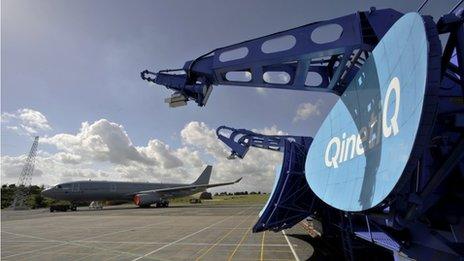Unlikely front line in the war on cybercrime
- Published

The view is quite glorious from the top of the Worcestershire Beacon: 360 degrees of the coloured counties of England fading into the distant mountains of greyer and less coloured Wales.
This is the main summit on the spine of the Malvern Hills, where one day in the middle of the 14th Century William Langland lay down to sleep and dreamed one of the greatest English poems - Piers Plowman.
Down below the hills reposes the spa town of Great Malvern. For many years this was the home of the composer Edward Elgar.
Nothing has better evoked the passionate and melancholic expanses of the English countryside than his music. This ancient elemental atmosphere is breathed by every walker on the Malvern Hills.
But there is more than the music of Elgar stirring in and around Great Malvern. It may look rural and remote, but the town is also one of the surprising centres of a new and expanding industry.
It's on the front line of the battle against cybercrime. It may even be war.
James Bond
The story is unlikely but logical. More than 45 small cyber companies have sprung up in recent years in the surroundings of Malvern - Worcestershire, Herefordshire and Gloucestershire.
They are there very largely because of a decision made by the then Prime Minister Winston Churchill in the middle of the World War Two. In 1942, he ordained that the ground-breaking work being done by British scientists on the new technology of radar should be transferred to a part of the country less likely to be bombed by German planes.
The government's Telecommunications Research Establishment (TRE) moved into Malvern College; their work helped to win the war. And science stayed in the town, until then best known for its spa and the Malvern Water it produced.
In the early 1950s, a scientist working in Malvern foresaw in a published paper how the transistor might lead to the integrated circuit: the foundation of the computer.

QinetiQ was formed following the privatisation of the government's Defence Evaluation and Research Agency (Dera)
The government work expanded: the TRE changed its name and role several times, eventually becoming Dera - the Defence Evaluation and Research Agency. Highly secretive, it not only tested armaments, it devised them.
One of the departments eventually folded into Dera is supposedly the place to which James Bond came to ask his boss "Q" for the latest advanced gadgetry.
Clever people worked for Dera and its predecessors. At one time Malvern was said to have one of the highest concentrations per head of PhDs in the country. They were all scientific civil servants, until the beginning of the 2000s.
That was when much of Dera was privatised. It became a company with the pompous and meaningless name QinetiQ, and it put a lot of effort into winning overseas government clients.
It has also been laying off staff in a commercial-company way probably not experienced in the old civil service days.
Growing paranoia
But the existence of Dera and then QinetiQ in Malvern had created a little island of technology expertise in the countryside, with computer security as a speciality.
This was just the sort of thing you might expect a government agency to be good at, and it happens that Great Malvern is not very far from the huge government intelligence agency GCHQ in Cheltenham, and the headquarters of the Special Air Services (SAS) in Hereford.

QinetiQ says it blocks an average eight cyber-attacks on clients each day
Intelligence and communications are in the air in and around Malvern, and now a cluster of small cyber security companies are springing up to exploit a growing paranoia about the dangers out there on the internet.
Big company QinetiQ itself runs a security operation on its Malvern campus for corporate and government clients.
They let me into the secure room there, but I was not allowed to record in the room. They say that on an average day, they identify and block eight cyber-attacks from snooping on or damaging their customers' networks.
One of the many screens in the secure room gave the operators a constant feed of tweets and other social media communications. Hackers seemingly like to brag about the exploits they have done or are about to embark on, sometimes alerting the crime busters to an imminent attack.
Brain-powered towns
Many of the tiny start-ups are specialising so narrowly in a particular aspect of cyber-protection that it is difficult for outsiders such as me to grasp what they are doing. So they need to work together.
To that end, an effervescent woman called Emma Philpott has formed something called the Malvern Cyber Security Cluster, a networking group for like-minded people.
A returnee to the area with a hi-tech background, she was astonished to find that many of the various cyber-companies she ran into in and around the town did not know much about each other's existence.
Now they meet regularly to exchange experiences, and to try to put the area on the cyber-map. Maybe to raise money, too, though these are new businesses fuelled by brain power and an injection of redundancy money or investment from friends and family. Ingenious companies can often be run on cash flow from early sales of software or hardware.
Because I was new to the Malvern cluster, I was bothered by the fact that the new businesses I'd never heard of are so small, and might all be doing very overlapping things. Should there not be mergers and re-shapings so that all this activity is more co-ordinated, I asked?
"No," they said, "collaboration is how we work anyway." Small companies instinctively configure their informal working partnerships (with others in the area) in order to win a contract or carry it out.
There are other clusters of computer security firms in the UK, normally in brain-powered towns such as Cambridge, where it is a particular speciality. As an outsider in Malvern, I was very surprised that such a cluster of clever companies should arise well away from any university.
But they pointed out that QinetiQ and its predecessors had been just as much a centre of research as any university lab. Lovely country, clever people, that's how Malvern works.
And in the future, it may be how many other places work and prosper. Working from everywhere has been made possible by the networked computer. Despite the lure of ultra concentrated Silicon Valley USA, working from anywhere may soon be a reality.
That's what they say in and around Malvern, anyway.
To hear more about Peter Day's visit to Great Malvern, listen to In Business on Radio 4 on Thursday, 16 January at 20:30 GMT, repeated on Sunday, 19 January at 21:30 GMT.